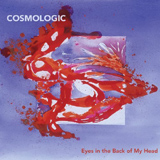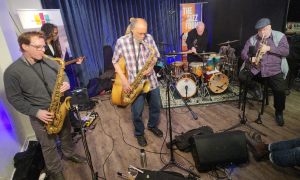Home » Jazz Articles » Live Review » Vision Festival 2008: Day 4
Vision Festival 2008: Day 4
...the final piece encapsulated Smith's compelling amalgam of visceral power and conceptual vision for a storming set closer
Steve Swell-Gebhard Ullmann Quartet; Bobby Few and Sonny Simmons; Henry Grimes with Sabir Mateen Quartet; Connie Crother; Wadada Leo Smith's Golden Quintet
13th Annual Vision Festival
Clemente Soto Velez Cultural Center
New York City
Friday, June 13, 2008
For the second of the week's panel discussions on Friday afternoon at the Vision Festival, the topic was "Jazz Factions," with representation drawn from across the creative music spectrum, including several musicians in the audience. As always it was difficult to find a consensus, but there was a heartening degree of comradeship from all sides and a common desire to avoid externally imposed labels. Of interest was William Parker's preferred term to avoid jazz factions—"Black Mystery Music"—the Vision Festival's approach to promoting diversity through a booking policy which favors a certain percentage of black artists.
Friday evening presented a varied bill of fare to the packed house, with strong sets from the Steve Swell- Gebhard Ullmann Quartet, solo pianist Connie Crothers, and Wadada Leo Smith's Golden Quartet, not only one of the Festival's high-points but possibly the set of the Festival.
Steve Swell-Gebhard Ullmann Quartet

Trombonist Steve Swell brought his quartet, co-led with German reedman, Gebhard Ullmann, to the Vision Festival on the back of a North American tour in April and May, and their experience showed in their relaxed demeanour and togetherness, even more in evidence than on their exceptional Desert Songs and Other Landscapes (CIMP, 2004). Swell now graces ensembles ever wider than his downtown heartland, with his fierce improvisational intellect. In Ullmann he has found a partner comfortable in a wide range of situations and adept at promoting cross pollination between them through his writing. Consistency of personnel is important to the group's sound, and they have been fortunate to recruit and retain increasingly in demand bassist Hill Greene while providing a welcome platform for a renascent Barry Altschul on drums.
As a working band of more than four years, their quartet blended composition and improvisation in a way that resisted easy separation. Over the course of five pieces in a well-paced 45-minute set, the well rehearsed arrangements saw the players move among angular themes, simultaneous horn conversations and involving solos with a natural ease borne of familiarity. On tenor saxophone, Ullmann proved muscular, though with a querulous, keening edge hinting at vulnerability, while on bass clarinet he frequently percolated through the registers, culminating in vocalised yelps. Whether directing the improvisational flow or delivering forceful yet nuanced solos, while bending sideways to keep his trombone on mic, Swell was at the top of his game. Greene walked, riffed and generated momentum, sometimes with his bass almost horizontal during his more animated moments.
Altschul is a master percussionist, striking his drums as crisply as anyone during the Festival, and taking a wonderfully artful solo during the last piece, a Swell favourite, the loping "Impatient Explorer," which incorporated the two-beat pattern from the theme as a recurring motif, embellished on all parts of his kit, before leading back to the head. From here the band decrescendoed to silence, luring the audience into applause, only to take off again with an all hell-breaking-loose cadenza which ended as suddenly as it began, for a great conclusion to a fine set.
Bobby Few and Sonny Simmons
There can't be too many Vision Festival performances which start with the pianist telling a joke and which involve the saxophonist singing his version of Frank Sinatra's "It Was a Very Good Year," but that's what we got from the duo of veterans Bobby Few and Sonny Simmons. The duet format left lots of space especially for the pianist, enabling him to display his fluid, even florid, style, revelling in call-response exchanges between his hands, at times evoking an almost spiritual feel.
On alto saxophone, Simmons alternately soulful and piercing, moved in loose conjunction with Few through their melodic and good-natured 40-minute set. Having received the signal to finish, Simmons began winding down for a joint conclusion, but the mischievous Few was having none of it, launching repeatedly into just one more chorus, before finishing with a hammering run, in his own good time.
Henry Grimes with the Sabir Mateen Quartet

The next set paired bassist Henry Grimes and reed master Sabir Mateen with two Paris-based expatriates in trumpeter Rasul Siddik and drummer John Betsch. They had a program of three pieces starting with a poem read by Grimes, which set the scene for an extemporised soundscape, a composition by Mateen dedicated to the World Trade Center victims, and finally an involved theme by Siddik alternating a stop-start head with free interludes.
Unfortunately Grimes' bass suffered a persistent sound problem with the bottom strings, which wasn't fixed and which clearly distracted him and the band to the extent that the execution didn't really match the conception, in spite of some fine rasping, soaring solos from Siddik, and the always fluent Mateen. A shame as they were clearly looking towards something beyond the standard free-jazz blow-out session.
Connie Crothers
Having heard pianist Connie Crothers discussing Lennie Tristano and Dizzy Gillespie with Phil Schaap on WKCR earlier in the week, I was expecting her Vision set to be a more traditional recital. But Crothers began by stating how inspirational she found the Vision Festival, and she certainly did seem inspired. Despite a serene look on her face, she pitched a stabbing left hand against dark rumblings in her right in the first of four thrillingly expressionistic, freely improvised pieces.
Sadly her set was cut short, with MC Lewis Barnes even asking the audience if they wanted more after the third piece. When answered with a resounding yes, Crothers responded with a forearm smash on the keyboard, then used the flats and heel of her hands to pound the registers, before morphing into measured chords contrasted with an extemporized bluesy line. Finishing with a series of karate chops up and down the keyboard, Crothers received an affectionate standing ovation for her all too brief appearance.
Wadada Leo Smith's Golden Quartet

The last set of the evening was a monster. For this performance trumpeter Leo Smith's Golden Quartet became a quintet with the addition of second drummer Pheeroan ak Laff to join bassist John Lindberg, pianist Vijay Iyer, who also contributed electronics, and drummer Famadou Don Moye of Art Ensemble of Chicago fame.
Though surrounding himself with leaders, Smith made no concessions to cooperative modes of working: he was imperious, holding up scores to indicate the next piece without turning round to those behind him, and marshalling his forces in line with a fiercely honed aesthetic. While his directing style may not have been pretty, it produced outstanding results and was a Festival highlight, keeping me on the edge of my seat throughout in spite of the length, heat and late hour.
During five pieces lasting over 70 minutes, Smith's compositions proved tantalising: a unison line here or a riff there, but so integrated into the group conduction that each seemed organically whole. Starting with a spacey drone from Iyer's electronics backed by arco bass, Smith etched muted, echoplexed trumpet lines across the top. Dressed all in black and playing looking at the ground, the trumpeter seemed to have had acquired attitude as well as funk from his investigation of Miles Davis' mid 1970s electric bands. Stopping proceedings, he indicated to the two drummers to join, before layering long, intense trumpet tones over the churning rhythm.
Though Smith gave his band members lots of space, he also showed he could be particular about how they filled it. Lindberg played with great authority and purpose throughout. One solo stemming from a duet with Moye commenced with morse code pizzicato, spiced by slapping the body of the bass, and then the strings, in a dazzling musical and rhythmic display. Smith stood next to him as he continued, the leader seemingly intent on the bassist drawing ever deeper on his creative resources and on preventing the band from kicking in until the bassist subsided into silence, eliciting wild applause from the spellbound audience.
With electronic squiggles and wah wah trumpet alternating with passages of crushing funk, the final piece encapsulated Smith's compelling amalgam of visceral power and conceptual vision for a storming set closer. Given the massive overrun, the after Festival jam session was cancelled, but in truth I was already musically sated and it was hard to see how this performance could have been followed let alone bettered.
Saturday promised to be packed full of quality too, with the showcase for emerging artists in the afternoon and then a series of highly anticipated performances from Matthew Shipp, Paul Dunmall, George Lewis and Joelle Leandre, as well as unanticipated pleasures from a quartet of Italian musicians to complete the day's festivities.
Photo Credit
Frank Rubolino (Ullmann and Swell)
John Sharpe
Day 1 | Day 2 | Day 3 | Day 4| Day 5 | Day 6
Tags
PREVIOUS / NEXT
Support All About Jazz
 All About Jazz has been a pillar of jazz since 1995, championing it as an art form and, more importantly, supporting the musicians who make it. Our enduring commitment has made "AAJ" one of the most culturally important websites of its kind, read by hundreds of thousands of fans, musicians and industry figures every month.
All About Jazz has been a pillar of jazz since 1995, championing it as an art form and, more importantly, supporting the musicians who make it. Our enduring commitment has made "AAJ" one of the most culturally important websites of its kind, read by hundreds of thousands of fans, musicians and industry figures every month.
























